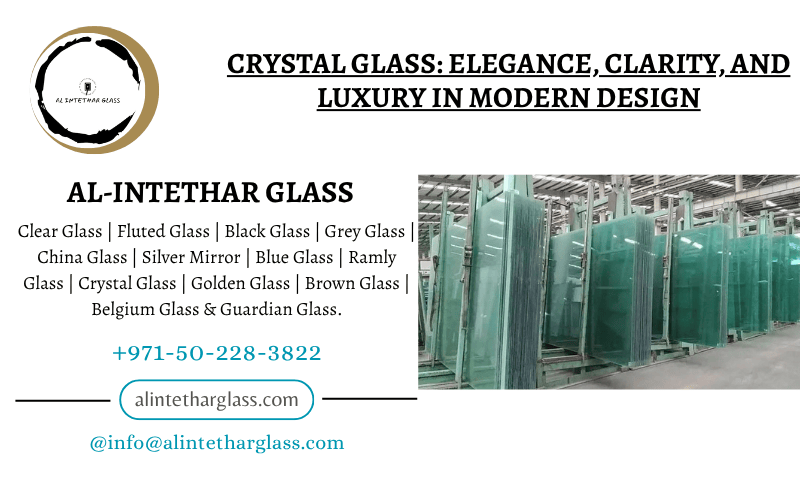The glass industry in Dubai has emerged as one of the most dynamic and rapidly expanding sectors in the region. As a global hub for construction, architecture, and luxury design, Dubai’s demand for high-quality glass products continues to soar. From sleek skyscrapers to elegant interiors, glass has become an essential element of the city’s visual identity and infrastructure development. This article explores the evolution, scope, and future of the glass industry in Dubai, highlighting its contribution to the emirate’s economic and architectural landscape.
1. Evolution of the Glass Industry in Dubai
The glass industry in Dubai has undergone a remarkable transformation over the past few decades. In the early 1990s, the market primarily relied on imported glass from Europe and Asia. However, with the city’s construction boom in the 2000s, local manufacturing and processing units started to flourish. The establishment of industrial zones like Dubai Industrial City and Jebel Ali Free Zone (JAFZA) provided an ideal platform for glass manufacturers to expand operations.
Today, Dubai is home to numerous glass factories specializing in float glass, tempered glass, laminated glass, reflective glass, and insulated glass units (IGUs). This local production capability not only meets domestic needs but also supports export demand across the Middle East, Africa, and Asia.
2. Role of Glass in Dubai’s Architecture
Dubai’s architectural identity is defined by glass. The city’s skyline, dominated by futuristic towers and luxury developments, showcases the versatility of glass as both a functional and aesthetic material. Iconic landmarks such as the Burj Khalifa, Museum of the Future, and Dubai Frame use advanced glass technologies to achieve a balance between design and performance.
Architects in Dubai prefer glass for its ability to:
- Enhance natural light and energy efficiency.
- Provide panoramic views of the city’s urban and coastal landscapes.
- Support modern and minimalist design concepts.
- Contribute to sustainable construction practices through energy-saving glazing solutions.
From commercial skyscrapers to high-end villas, glass has become a symbol of innovation, transparency, and modern luxury in Dubai’s architectural vision.
3. Types of Glass Products in Demand
The diversity of Dubai’s glass industry lies in its wide range of products and applications. Some of the most in-demand glass types include:
- Tempered Glass: Known for its strength and safety, it’s widely used in doors, facades, and partitions.
- Laminated Glass: Provides sound insulation and protection against breakage, making it ideal for high-rise buildings.
- Reflective Glass: Used to reduce solar heat and glare, enhancing building energy performance.
- Double-Glazed and Insulated Glass Units: Essential for thermal insulation and eco-friendly construction.
- Decorative Glass: Includes tinted, frosted, and patterned glass for interiors and artistic applications.
These products are engineered to meet Dubai’s extreme climate conditions, where temperature control and UV protection are critical for comfort and efficiency.
4. Major Players and Manufacturers in Dubai’s Glass Industry
Dubai’s glass market features a mix of local manufacturers, international brands, and processing companies. Some of the leading names include:
These companies continuously invest in smart manufacturing, automation, and sustainability initiatives to meet international standards and customer expectations.
5. Sustainability and Innovation in Glass Production
Dubai’s commitment to sustainable development has influenced the direction of its glass industry. The UAE Vision 2030 and Dubai Clean Energy Strategy 2050 promote eco-friendly building materials and energy-efficient designs. In response, glass manufacturers have introduced low-emissivity (Low-E) coatings, solar control glass, and recyclable glass materials that reduce environmental impact.
Additionally, innovations like smart glass technology—which allows users to control transparency and light transmission—are gaining popularity in commercial and residential projects. These innovations help conserve energy and enhance comfort, aligning perfectly with Dubai’s sustainability goals.
6. Export Potential and Regional Influence
Dubai’s strategic location at the crossroads of Europe, Asia, and Africa makes it an ideal export hub for glass products. The emirate’s world-class logistics infrastructure, including Jebel Ali Port and Dubai International Airport, supports seamless global trade.
Dubai’s glass manufacturers export to countries such as Saudi Arabia, Oman, Qatar, Bahrain, India, and Egypt, supplying materials for major construction projects across the region. The Gulf Cooperation Council (GCC) market continues to be a strong destination due to ongoing urban development and infrastructure expansion.
7. Challenges Facing the Glass Industry in Dubai
Despite its growth, the industry faces several challenges:
- High energy costs in glass production and processing.
- Competition from imported products offering lower prices.
- Fluctuating raw material prices and global shipping disruptions.
- Stringent sustainability and safety regulations that require continuous technological upgrades.
However, Dubai’s robust business environment and government support for manufacturing innovation help mitigate these challenges, ensuring long-term stability and competitiveness.
8. Future Outlook of the Glass Industry in Dubai
The future of the glass industry in Dubai looks exceptionally bright. As the city continues to expand with mega projects like Expo City Dubai, Dubai Creek Harbour, and Palm Jebel Ali, the demand for advanced glass solutions will rise.
Emerging trends such as AI-based glass production, 3D-printed glass structures, and solar-integrated glazing systems are expected to redefine the industry’s capabilities. Additionally, the focus on smart cities and green building certifications (LEED, Estidama, etc.) will further drive the adoption of high-performance, sustainable glass technologies.
Conclusion
The glass industry in Dubai stands as a symbol of progress, innovation, and sustainability. From its humble beginnings to its current status as a regional powerhouse, the sector has become an integral part of Dubai’s vision for a modern, energy-efficient, and architecturally inspiring future.
Glass Industry In Dubai As technology continues to evolve and global demand for sustainable materials grows, Dubai’s glass industry is poised to lead the transformation—offering cutting-edge solutions that combine functionality, design excellence, and environmental responsibility.
In essence, the glass industry in Dubai is not just about manufacturing a product; it’s about shaping the skyline of tomorrow—one pane at a time.
Tags: Architectural Glass Dubai, Building Glass Dubai, Decorative Glass UAE, glass company in dubai, Glass Fabrication Dubai, Glass Industry In Dubai, Glass Manufacturer Dubai, Glass Processing UAE, Glass Supplier UAE

